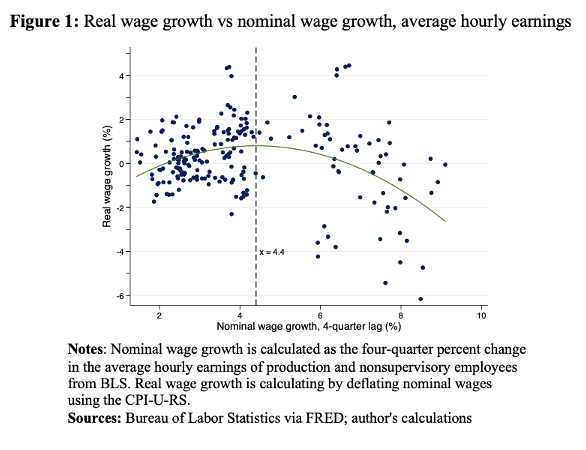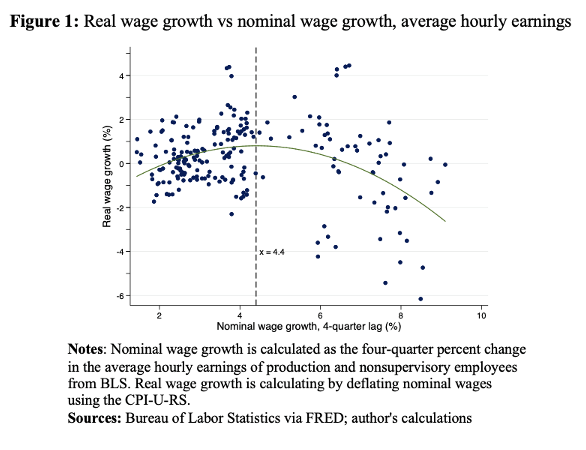ということをサマーズがファーマンのWSJ論説にリンクしつつ4/13ツイートで強調している。
@jasonfurman has a smart article making the point that in neither economic theory nor empirical experience does a hot economy produce higher real wages. The contrary idea is a Washington myth.
https://wsj.com/articles/even-in-a-hot-economy-wages-arent-keeping-up-with-inflation-unemployment-job-growth-federal-reserve-11649779113?reflink=desktopwebshare_twitter via @WSJOpinion
@asdomash and I demonstrate a corollary proposition: past a certain point, faster wage growth correlates with slower real wage growth. We are now having highest wage inflation and slowest real wage growth in decades.
medium.com
The relation between nominal and real wage growth
By: Alex Domash¹ and Lawrence H. Summers²
Wage growth is a kind of super core measure of inflation. It is now running above 6 percent. Unless it slows down, which seems unlikely with rapidly tightening labor markets, hard to see how inflation stabilizes.
Can we enforce a rule for inflation commentators? No one who dismissed inflation fears a years ago on grounds of transitory movements in used car prices is allowed to celebrate low core inflation now without highlighting the significant role of used car prices.
(拙訳)
ジェイソン・ファーマンが、経済理論と実証的経験のいずれにおいても、過熱経済は実質賃金の上昇をもたらさない、ということを指摘した賢明な記事を書いている。それと反対の考えは、ワシントンにおける神話である。
wsj.com
ドマッシュと私は、その系となる命題を示した。ある点を過ぎると、賃金の伸びの上昇は実質賃金の伸びの鈍化と相関する。今や我々はここ数十年で最も高い賃金インフレと最も低い実質賃金の伸びを経験している。
medium.com
賃金の伸びはインフレの超コア指標のようなものである。それが今や6%を超えている。急速に逼迫している労働市場では起こりそうもないが、それが鈍化しない限り、インフレが安定する見通しは乏しい。
インフレにコメントする人にあるルールを適用できないものか? 1年前に中古車価格の一時的な動きを理由にインフレ懸念を退けた人は、中古車価格の顕著な役割を強調することなしに今の低いコアインフレを言祝ぐべきではない*1。
このサマーズの一連のツイートにジョン・コクランが反応して以下のようにツイートしている。
Furman's article is very nice indeed. To clarify, "hot" driven by demand cannot produce much higher real wages -- prices rise faster. Real wages in the end must match productivity. A hot "supply" economy from higher productivity can raise real wages. Source of heat matters
(拙訳)
ファーマンの記事は実際非常に素晴らしい。はっきりさせておくと、需要による「過熱」は実質賃金の上昇をもたらすことができない――物価の方が速く上昇する。実質賃金は最終的には生産性に相当しなければならない。生産性上昇で過熱した「供給」経済は実質賃金を引き上げることができる。熱の源泉が重要なのだ。
このコクランのツイートにオースタン・グールズビーが以下の疑問を投げ掛けた。
But it’s still a weird puzzle that real productivity is up a fair bit from pre pandemic while real wages are not, isn’t it?
(拙訳)
しかしコロナ禍前から実質生産性がかなり上がったのに実質賃金が上がっていないのはやはり奇妙なパズルではないだろうか?
これにファーマンが反応し、両者の間で以下のやり取りが交わされている。
Productivity just barely above its pre-pandemic trend.
This is nominal productivity?
I’ve never heard of nominal productivity. This is real output per hour in the nonfarm business sector. The standard headline BLS series.
But then why compare real productivity to nominal compensation growth?
Real productivity is up 5% but real wages are down. That’s what seems odd.
(拙訳)
- ファーマン
- 生産性はコロナ禍前のトレンドを少し上回っているに過ぎない。
- グールズビー
- これは名目生産性?
- ファーマン
- 名目生産性など聞いたことが無い。これは非農業部門の時間当たり実質生産である。労働統計局の標準的なヘッドライン系列である。
- グールズビー
- ではなぜ実質生産性を名目報酬の伸びと比べるのか?
実質生産性は5%上がっているのに実質賃金は下がっている。それが奇妙に見えることだ。
ちなみに、「ではなぜ実質生産性を名目報酬の伸びと比べるのか?」というグールズビーの問い掛けに対しては、サマーズが「私の知る限りそんなことをしている人はいない(No one is doing that to my knowledge.)」と応じている。
なお、サマーズは4/14ツイートでも改めて名目賃金と実質賃金の関係に関するDomashとの研究結果を強調している。
My new study w @asdomash shows that nominal wage growth and real wage growth are historically not correlated. Indeed, faster nominal wage growth above 4 percent is associated with slower real wage growth.
We also show that historically nominal wage growth does not slow without a recession and that current wage growth implies sustained inflation above 5 percent.
Achieving a soft landing will be very difficult.
(拙訳)
私のドマッシュとの新たな研究は、名目賃金の伸びと実質賃金の伸びは歴史的に相関していないことを示した。実際のところ、4%を超える名目賃金の高い伸びは、実質賃金の伸びの鈍化と結び付いている。
我々はまた、歴史的に名目賃金の伸びは景気後退抜きで鈍化しないこと、および、現在の賃金の伸びは5%以上の持続的なインフレを意味することを示した。
軟着陸の達成は非常に困難だろう。
medium.com


